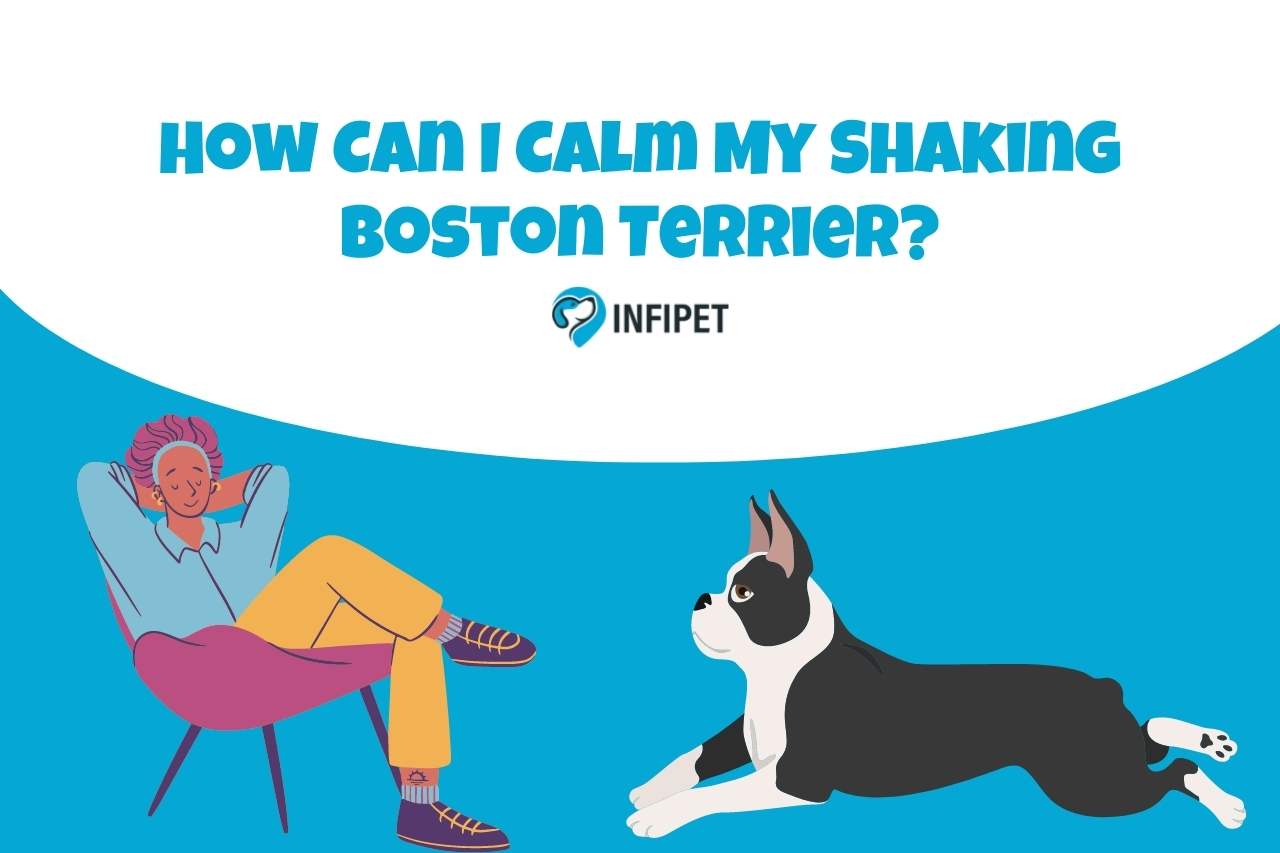Have you ever questioned why Boston Terriers often quiver or shake? You’ve come to the right article if you’ve been interested in learning more about this unusual habit displayed by these gorgeous dogs. This article explores the world of Boston Terriers in-depth and sheds light on the causes of their shaking episodes. Boston Terriers, one of the most adored dog breeds, enthrall us with their energetic personalities, silly antics, and undeniable charm. However, many owners may be concerned by their inclination to tremble.
Why Do Boston Terriers Shake?
A Boston Terrier may shake as a natural reaction to try to warm up or relieve discomfort if it is chilly or uncomfortable. Dogs may shake to produce heat or to indicate that they require relocation to a more comfortable setting.
Dogs, like humans, can get stressed or anxious under certain circumstances. Shaking can be an expression of anxiety or dread. It might happen during thunderstorms, pyrotechnics, or when they are exposed to unfamiliar situations or individuals. Because of their vibrant and enthusiastic personality, Boston Terriers are known to shake when stimulated.
This may occur when they look forward to playing, run into a favorite person, or come across something of interest.
Shaking may be a sign of a medical ailment underneath. For instance, some neurological conditions, such as tremors or seizures, can shake dogs.
It’s crucial to keep an eye out for your Boston Terrier’s further symptoms or behavioral changes and to visit a veterinarian if you have any concerns.
Should I Be Worried If My Boston Terrier is Shaking?
It’s always preferable to err on the side of caution and get advice from a veterinarian if your Boston Terrier is trembling and you are worried. While shaking occasionally can be acceptable, especially in specific circumstances like excitement or minor discomfort, persistent or excessive shaking could point to a problem that needs to be addressed.
- If your Boston Terrier shakes occasionally and the vibration is slight, it might not be a severe problem immediately. It is advised to seek veterinary guidance if the shaking is persistent, consequential, or accompanied by other uncommon symptoms. Keep track of any additional symptoms your Boston Terrier may be exhibiting.
- Changes in appetite, lethargy, vomiting, diarrhea, trouble walking, or any other strange behaviors may be among them. A veterinarian can assess the condition more accurately if you report these symptoms to them.
- Think about the environment that the shaking takes place in. If your Boston Terrier only trembles in specific circumstances, as during thunderstorms or vehicle rides, it may be a sign of fear or anxiety. In such cases, you might speak with a vet or expert dog trainer about possible methods to lessen their tension.
In conclusion, while the odd trembling may not necessarily be serious, persistent or worrying trembling should necessitate a trip to the vet. They may assess the general health of your Boston Terrier, carry out any required examinations or tests, and advise you on the best course of action.
How to Stop your Boston Terrier from Shaking?
Provide a Secure and Comfortable Environment
Check to see whether the shaking has an underlying cause. Is your Boston Terrier chilly, frightened, excited, or suffering from any pain
Especially in the winter, ensure they can access a cozy bed or blanket. Shaking brought on by cold or discomfort can be lessened by providing a secure and comfortable environment.
You might try a few approaches if your Boston Terrier shakes as a result of stress or anxiety:
Create a Secure and Tranquil Environment
Create a peaceful space where your dog can seek refuge if they become anxious. This can be a kennel, a particular area, or a cozy spot with their preferred blankets and toys.
Treats, praise, and affection should be given to your Boston Terrier when they behave calmly or handle stressful situations well. Over time, this can aid in bolstering favorable associations and lowering anxiety.
Gradual Desensitization
Consider gradual desensitization if your Boston Terrier exhibits signs of stress or trembling in specific settings (such as thunderstorms or automobile rides).
Starting with a low-intensity version of the triggering stimulus, expose them to it progressively in a controlled way.
As they grow accustomed to it, they raise the exposure level. Making positive associations and lowering anxiety can be achieved by associating these events with enjoyable activities like sweets or games.
It’s critical to see a vet if your Boston Terrier shakes persistently, gets worse, or is showing other unsettling signs.
They can assess your dog’s health, ascertain whether an underlying medical disease exists, and offer suitable care or advice.
Why Won’t My Boston Terrier Stop Shaking?
Speaking with a veterinarian is crucial if your Boston Terrier shakes despite your attempts to fix the problem. Your dog may continue to shake for a number of reasons, including underlying medical disorders that need to be diagnosed and treated by a veterinarian.
Medical Ailments
Dogs may exhibit chronic shaking due to various medical ailments, including discomfort, neurological issues, hormonal imbalances, and muscle tremors.
A veterinarian can perform a complete examination, perform the required tests, and diagnose correctly. Even if you reduce stress, your Boston Terrier can still tremble if it experiences persistent worry or dread.
A veterinarian may advise behavior modification methods, medication, or other interventions in these situations to assist control anxiety.
Environmental Influences
Your Boston Terrier may shake because of environmental influences you are unaware of. A veterinarian or a qualified dog behaviorist can assist in identifying potential triggers and offer advice on how to control or lessen their effects.
Sensitivities or Illnesses
Dogs can experience particular sensitivities or illnesses that make them more prone to shaking, much like humans.
Your Boston Terrier may shake naturally as a reflex or feature, which does not necessarily mean a problem.
You can get a correct diagnosis and advice that is personalized to your Boston Terrier’s situation by speaking with a veterinarian.
They can assist in identifying the underlying cause of the shaking and provide suitable treatment choices or behavior modification strategies to effectively address the problem.

How Can I Calm My Shaking Boston Terrier?
-
Create a Peaceful, Cozy Area for your Boston Terrier So They Can Unwind
- Ensure they have a comfortable bed, plush blankets, and enjoyable toys.
- Reduce the amount of loud noises, frantic activity, and unpleasant stimuli in their immediate environment.
-
Keep Calm and Use a Soothing Voice When Speaking to your Boston Terrier
- If your dog appreciates it, give him some light petting or massage.
- Physical contact may reassure people and put them at ease.
- Dogs typically enjoy their routine because it gives them a sense of security and predictability. Maintain a regular daily meal, exercise, and rest schedule.
-
Creating a Performance Can Assist in Lessening Anxiety and Trembling
Try some of the Soothing Strategies Listed Below:
- Using a weighted blanket or a snug-fitting shirt to press into your Boston Terrier’s body gently may have a calming impact.
- Soft, tranquil music or white noise can help block out outside disturbances and provide a relaxing environment for your dog.
- Some scents are comforting to dogs. When used sparingly, canine-specific lavender or chamomile essential oils can aid in promoting relaxation. A veterinarian should be consulted before utilizing any essential oils.
- Engage in activities with your Boston Terrier to help them unwind and stimulate their minds, such as leisurely walks, puzzle games, or slow-paced training sessions. They can change their concentration and stop shaking with the aid of mental and physical stimuli.
- Consult a veterinarian for advice if your Boston Terrier continues to shake despite your best efforts to soothe them or if other unsettling signs accompany it. They can evaluate your dog’s health, identify any underlying medical concerns, and, if necessary, offer more guidance or treatment alternatives.
Remember that every dog is different, so finding the best relaxing techniques for your Boston Terrier could take some trial and error. Be patient and watchful of your dog’s reactions, and ask a veterinarian for specific advice.
Watch this video to get more info,
Video Credits – Boston Terrier Society
You May Also Like
- When Do Boston Terrier Ears Stand Up? From Floppy to Perky!
- French Bulldog vs Boston Terrier – Which Breed Is Right for You?



